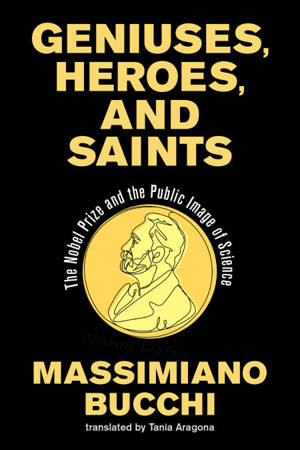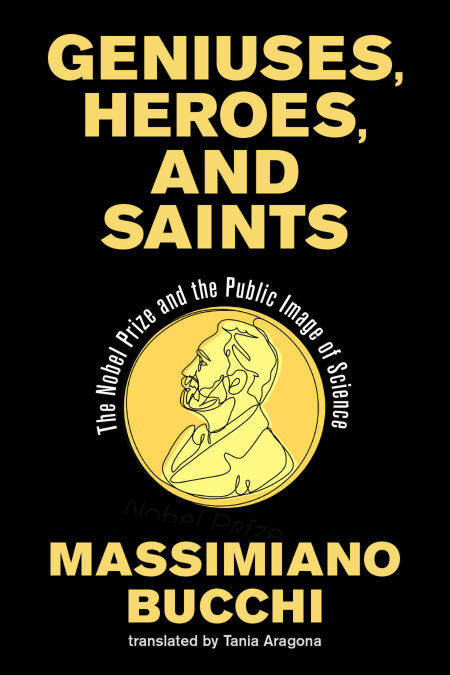
Je cadeautjes zeker op tijd in huis hebben voor de feestdagen? Kom langs in onze winkels en vind het perfecte geschenk!
- Afhalen na 1 uur in een winkel met voorraad
- Gratis thuislevering in België vanaf € 30
- Ruim aanbod met 7 miljoen producten
Je cadeautjes zeker op tijd in huis hebben voor de feestdagen? Kom langs in onze winkels en vind het perfecte geschenk!
- Afhalen na 1 uur in een winkel met voorraad
- Gratis thuislevering in België vanaf € 30
- Ruim aanbod met 7 miljoen producten
Zoeken
Geniuses, Heroes, and Saints E-BOOK
The Nobel Prize and the Public Image of Science
Massimiano Bucchi
E-book | Engels
€ 34,49
+ 34 punten
Omschrijving
A rich account of the world’s leading science prize told through the lives it has changed, the controversies it has generated, and the impact it has made on the public.
In a world where the work of science largely remains inscrutable to the general public, the Nobel Prize confers a degree of intelligibility like no other honor. Our best-known and most prestigious award for individual scientific achievement, the Nobel attaches a brilliant face to a story of profound discovery, making moving headlines. In Geniuses, Heroes, and Saints, Massimiano Bucchi tells an equally compelling story of the Nobel’s transformation of science into an epic pursuit legible both to the field and to the public, bound up with the currents of historical change.
Three main narratives characterize the Nobel. The scientist as genius, portrayed as a creative visionary, an exceptional intellect reflecting a solitary and romantic ideal of great communicative impact. The scientist as national hero acts as a surrogate of competition among nations in a peaceful, rational contest. The scientist as saint shines with moral exceptionality, a figure worthy of celebration and worship, known for virtues such as modesty, humility, and total dedication, body and soul, to the scientific enterprise. Whether the recipient was Albert Einstein or a countryside doctor toiling for years in obscurity, whether the prize was worthily given or awarded to work later disproved, or whether we even remember the honorees today, the Nobel defined the image of science in the twentieth century, Bucchi shows, an image that still lives in all sorts of fascinating ways today.
In a world where the work of science largely remains inscrutable to the general public, the Nobel Prize confers a degree of intelligibility like no other honor. Our best-known and most prestigious award for individual scientific achievement, the Nobel attaches a brilliant face to a story of profound discovery, making moving headlines. In Geniuses, Heroes, and Saints, Massimiano Bucchi tells an equally compelling story of the Nobel’s transformation of science into an epic pursuit legible both to the field and to the public, bound up with the currents of historical change.
Three main narratives characterize the Nobel. The scientist as genius, portrayed as a creative visionary, an exceptional intellect reflecting a solitary and romantic ideal of great communicative impact. The scientist as national hero acts as a surrogate of competition among nations in a peaceful, rational contest. The scientist as saint shines with moral exceptionality, a figure worthy of celebration and worship, known for virtues such as modesty, humility, and total dedication, body and soul, to the scientific enterprise. Whether the recipient was Albert Einstein or a countryside doctor toiling for years in obscurity, whether the prize was worthily given or awarded to work later disproved, or whether we even remember the honorees today, the Nobel defined the image of science in the twentieth century, Bucchi shows, an image that still lives in all sorts of fascinating ways today.
Specificaties
Betrokkenen
- Auteur(s):
- Vertaler(s):
- Uitgeverij:
Inhoud
- Aantal bladzijden:
- 208
- Taal:
- Engels
Eigenschappen
- Productcode (EAN):
- 9780262382526
- Verschijningsdatum:
- 12/05/2025
- Uitvoering:
- E-book
- Beveiligd met:
- Adobe DRM
- Formaat:
- ePub

Alleen bij Standaard Boekhandel
+ 34 punten op je klantenkaart van Standaard Boekhandel
Beoordelingen
We publiceren alleen reviews die voldoen aan de voorwaarden voor reviews. Bekijk onze voorwaarden voor reviews.









